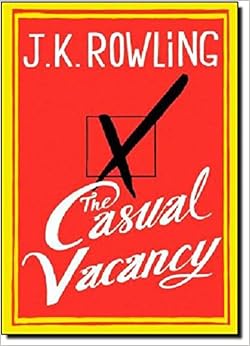
The Casual Vacancy, by J.K. Rowling
© 2012 Little, Brown Book Group
I realize I'm a few years late with this review, but for a long time I wasn't sure I'd ever read this book. My wife read it when it came out, and she told me the story was so dark and tragic that it'd probably just depress me. I gave her permission to tell me how it ended, and when she told me, I decided that it did sound a lot darker than Ms. Rowling's previous works. But after becoming familiar with Rowling's Cormoran Strike mystery novels, I figured that whatever was in The Casual Vacancy couldn't be any darker than Career of Evil, so I decided to give Vacancy a try.
A lot of readers were surprised and dismayed to discover how grim and pessimistic this book is, despite the fact that Rowling repeatedly stated that this would emphatically not be a novel for children. Vacancy is an unflattering portrait of humanity at best, and a disturbing tour of human misery at its darkest (it's never lurid, though -- Rowling simply reports on her characters actions without judgment, for the most part).
The novel tells the story of a fictional West Country village named Pagford, which is a satellite of Yarvil, a nearby urban center. The two municipalities are separated by a country estate, a previous owner of which sold some land to Yarvil, which they developed into a housing project called "The Fields". This greatly upset the citizenry of Pagford, since the land on which the Fields were built was part of Pagford Parish, meaning that Pagfordians were on the hook financially for the crime-ridden, ugly, and squalid Fields and the families (including many drug-users and welfare-recipients) who live in its squat, ugly cinderblock houses.
Vacancy opens sixty years after these events, with the sudden death by aneurysm of Pagford Parish Councillor Barry Fairbrother, leader of the small-but-vocal faction of the parish council who are in favor of keeping the Fields as part of Pagford Parish. Having been born in The Fields and bootstrapped himself into a position of respect and power within Pagford, Barry was a living example of the narrative which he hoped to make reality for others from The Fields. Unfortunately, his death leaves an empty seat on the Parish Council, which the anti-Fields faction hopes to fill with one of their own.
The novel's main arc tells the story of the election which is held to fill Barry's empty seat, but it also zooms in on the petty rivalries, domestic unhappiness, infighting, and class-warfare which plague the picturesque Pagford. I won't attempt to explain all the characters and their relationships herein; that task would be better-suited to a spoileriffic character-map like this one. All you need to know going into it is not to worry if you can't keep all the families straight in your head; by the start of Part 2, you'll pretty much know who everyone is and who they're related to.
I was impressed at how scrupulously Rowling avoided making even the most sympathetic characters into paragons of virtue. It would have been easy for the author to (for instance) cast Dr Parminder Jawanda, the discriminated-against Sikh physician, as a poor unfortunate who is unfairly judged by the backwards inhabitants of Pagford -- but Rowling resists such temptation. Parminder is relentlessly critical of her youngest child Sukhvinder, a fact which (combined with her poor academics, obesity, and the relentless teasing she endures at school) drives the poor girl to self-harm, unbeknownst to Parminder.
For that matter, the children of Pagford are hardly paragons of youthful innocence. In fact, you could argue that most (or even all) of the truly tragic stuff that befalls Pagford during and in the wake of the election is their fault). Once one kid gets it into his head to post damaging information about his father on the village council forums under the username The_Ghost_of_Barry_Fairbrother, before you know it, practically all the kids are doing it to sabotage their own parents' chances of winning, with predictably damaging results for everyone in Pagford and the Fields.
I was particularly struck by two things in this novel: the shocking pettiness and cruelty of almost everyone from every social station, age bracket, and walk of life; and almost total lack of honest communication in any given interpersonal relationship. On the one hand, this seems fairly realistic to me, even if it doesn't paint a very flattering picture of humanity and left a bad taste in my mouth. On the other hand, it made me very, very glad that I escaped from high school with a shred of my human decency intact.
Overall, The Casual Vacancy is not an easy read, and will likely leave you feeling drained and discouraged about humanity in general. But it's also a novel which taps into the primal tribalism which continues to stifle progress and meaningful debate on both sides of the Atlantic, and as such, is a novel which I strongly recommend to pretty much everyone who has strong opinions, one way or another, on the subjects of drugs, poverty, the welfare state, and man's responsibility (or lack thereof) towards his fellow man.
